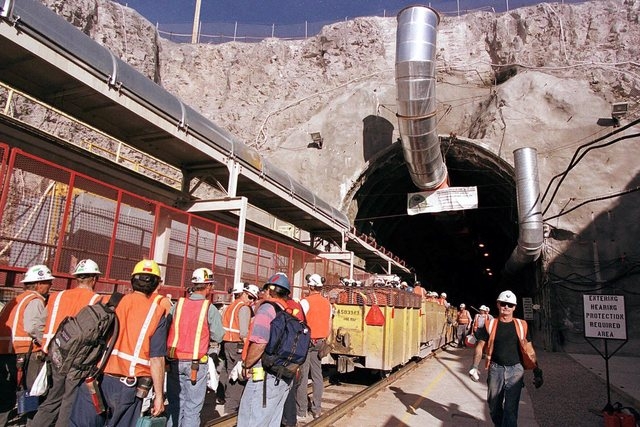
WASHINGTON — The Republican takeover of the U.S. Senate in Tuesday’s elections is giving new hope to those who see reviving the mothballed Yucca Mountain site as a solution to the nation’s nuclear waste problem.
The election returns have energized pro-Yucca interests who believe Sen. Harry Reid’s demotion to the minority saps the clout he has wielded to hold Democrats in line against the project opposed by many Nevadans.
But others say Reid still has ample power to keep the repository from being resurrected. And backing up the Nevadan is the Obama administration that pulled the plug on Yucca Mountain in 2010 even after the government spent $15 billion to study whether the site could be safe to store tens of thousands of tons of spent nuclear fuel.
More likely, some say, Yucca Mountain might end up being used as a bargaining chip to get other stalled legislation out of Congress that would put the government on a new path to address a thorny environmental issue — disposal of highly radioactive waste — that has stymied the United States since the dawn of the nuclear age.
“This change that happened does bring opportunities, how significant we don’t know yet,” said Lake Barrett, retired former top manager of the Yucca project. “It’s a step in the right direction toward the nation doing something rather than doing nothing.”
NEW SENATE ENERGY LEADERS
The Senate flip in January is expected to place pro-repository Republicans atop committees with jurisdiction over energy.
Sen. Lisa Murkowski of Alaska, who called for the Nuclear Regulatory Commission to complete licensing hearings on Yucca after an agency staff report last month concluded the site could be safe, is in line to head the Energy and Natural Resources Committee.
Sen. James Inhofe of Oklahoma, who once called Yucca Mountain “the most studied piece of real estate on earth,” is expected to take over the Senate Environment and Public Works Committee from Sen. Barbara Boxer, D-Calif., a strong Reid ally.
But as Yucca Mountain remained on the back burner in the Democrat-controlled Senate, Sen. Lamar Alexander of Tennessee and Murkowski also sponsored an alternative bill with Democratic Sens. Ron Wyden of Oregon and Dianne Feinstein of California that sought to pave a new path on nuclear waste.
The Nuclear Waste Administration Act of 2013 would create an independent agency that would seek volunteer states to host a repository, as well as short-term “interim storage” sites that would consolidate nuclear waste now scattered at more than 100 reactors around the country.
But it too has been stalled.
In the House, Rep. John Shimkus, R-Ill., a leading member in favor of the repository as chairman of the subcommittee on environment and the economy, said the elections gave Yucca Mountain backers new impetus.
“We will continue to press the administration to finish its licensing of Yucca Mountain. With willing partners in the Senate, we are hopeful we can work together next year to ensure we have a common-sense nuclear waste strategy in place and that a permanent repository will be completed,” Shimkus said in a statement.
NEVADA POLITICS AT PLAY
Reid continues to state that Yucca Mountain will not be revived as long as he is in Congress, and as long as Obama is around, and perhaps even the president after that.
“Yucca Mountain is gone,” Reid told reporters in Nevada last month. “For someone to talk about it being restarted all you have to do is talk to Barack Obama, that won’t happen. And I am sure his successor will feel the same way.”
Sen. Dean Heller, R-Nev., who sits on the Senate Energy Committee, said he too “will continue to defend Nevada from the efforts of outsiders to dump nuclear waste in our state against our will.”
But Nevadans in the 4th Congressional District on Tuesday elected Republican Cresent Hardy to Congress, and he has said he would favor storing nuclear waste at Yucca Mountain if it could be determined safe.
“I don’t think there’s a better place for it,” Hardy said at an April 3 candidate forum in Mesquite. “My belief is if it passes all the criteria of safety of the state of Nevada, I think it’s a great area for it. I believe that it actually can create many new jobs in the state of Nevada. If Nye County wants it then we start moving forward. I believe it’s a great spot for economic development.”
Hardy would be the first Nevada member of Congress in recent history to declare himself open to a Yucca repository. In the state’s new delegation, Reid, Heller and Democratic Rep. Dina Titus are against it. The positions of Republicans Joe Heck and Mark Amodei are more nuanced — they oppose a repository but say they would be open to utilizing the Yucca site 100 miles northwest of Las Vegas for nuclear waste-related research and activities.
Yucca Mountain supporters in Congress are expected to embrace Hardy and point to him as the face of Nevadans who favor a repository but whose voices, they say, are drowned out by state leaders.
But playing up Yucca Mountain also carries a risk for Republicans. Reid is up for re-election, and on Friday was declared by Washington Post political analysts as the second most likely to be defeated in 2016.
If the GOP believes Reid can be knocked off, do they want to revive Yucca Mountain as a campaign issue in a state where the Republican candidate, if it is Gov. Brian Sandoval or someone else, also might be opposed to the project?
Barrett said 2016 could test how much Nevadans care about Yucca Mountain.
“How high is this issue on the minds of Nevada voters?” Barrett asked. “How potent and powerful could it be in 2016? I honestly don’t know.”